

As lobbyists and state legislators gathered at San Diego’s Grand Hyatt resort last week for the three-day annual meeting of the American Legislative Exchange Council (ALEC), the delegates seemed to barely glance at the several dozen exhibitor tables that made up a sort of carnival sideshow of right-wing groups outside the hotel’s second-floor warren of meeting rooms.
Convention attendees had more pressing concerns. Namely, turning this year’s corporate wish list into the infamous boilerplate bills known as “model laws” that would aspire to undermine things like health and environmental standards, worker rights, campaign-spending limits and implementation of the Affordable Care Act (ACA) across the 50 states.
See more of our coverage of the ALEC Annual Meeting
Many of the exhibitor booths were occupied by familiar ALEC friends, such as the collection of extreme-right think tanks known as the State Policy Network,
…mill hands, farm hands, factory hands…hands….hands…hands…
— Eugene Debs
Ironworker Devonte Merrifield makes sure he takes care of his hands. He jokingly points out that the strength of his marriage depends on two strong – and sometimes soft – hands. “My wife complains because I can’t rub her back anymore because of my calluses. My hands can be a little rough,” he says, lifting his hands and smiling.
Merrifield is in some ways similar to my electrician father who believed that the feel of a person’s hands might indicate something about their character. Shaking my father’s hand was not merely a polite ritual. The absence of thick pads of calluses was, for him, one indication that you might not be contributing much to society.
Merrifield knows that what he does with his hands is deserving of a measure of respect. His identity is partly bound up with what he calls his “working man’s” hands and the confidence drawn from meeting the challenges of apprenticeship.
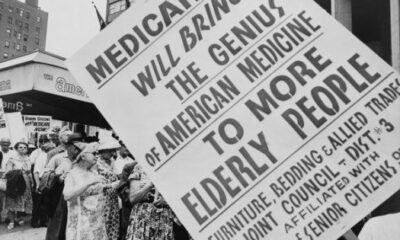

Fifty years ago this month, on July 30, 1965, President Lyndon Johnson signed into law an amendment to the Social Security Act that established Medicare, providing health insurance to people 65 and older regardless of income or medical history, and dramatically changed the landscape of senior health care for the better. As we celebrate this important anniversary, all of us should take a moment to consider how Medicare, the nation’s most successful and efficient health insurance program, continues to protect millions of seniors who might otherwise live without adequate health care or who might face bankruptcy because of medical bills.
As Medicare has been weaved into the fabric of our society, it’s hard to fathom a time when America placed its aging population at such risk, but prior to Medicare only 50 percent of Americans 65 and older had health insurance, and more than a third lived in poverty.
» Read more about: Celebrating Medicare’s 50th by Ensuring Medicare for All »


 When Medicare was signed into law on July 30, 1965, nearly half of Americans over 65 had no health insurance, and many more lacked adequate coverage. Today, only 2% of senior citizens in the U.S. are uninsured. To celebrate the success of Medicare and rally for universal expansion of the program, events are being held in more than 2 dozen cities across the country.
When Medicare was signed into law on July 30, 1965, nearly half of Americans over 65 had no health insurance, and many more lacked adequate coverage. Today, only 2% of senior citizens in the U.S. are uninsured. To celebrate the success of Medicare and rally for universal expansion of the program, events are being held in more than 2 dozen cities across the country.
The Los Angeles version will predictably have strong entertainment. There will be musical performances by Lili Haydn, who’s been called the “Jimi Hendrix of the violin,” along with Latino Hip-Hop group the Inner City Dwellers and musical parody group Billionaires for Wealthcare.
Also on the program are actor Mike Farrell of M*A*S*H, Richard Montoya of the performance troupe Culture Clash, State Senator Holly Mitchell, L.A. County Supervisors Sheila Kuehl, Hilda Solis, and Mark Ridley-Thomas,
» Read more about: This Thursday: Medicare is Having a Birthday Party »


Earlier this month, in yet another win for local control, leaders in one central Florida county rejected a proposal from a for-profit library management company to take over their public library. The company, Library Systems & Services (LSSI), operates at least 80 public libraries across the country, but Marion County joins a growing list of municipalities that realized that LSSI’s claim to do more with less while still making a profit was a greater fiction than even Stephen King’s best stories.
In 2010, the chief executive of LSSI admitted to the New York Times that the company saves money by cutting overhead and replacing unionized employees. “Cutting overhead” can mean fewer services and reduced hours. Privatized libraries make up for less professional staff by depending on unpaid volunteers and automation. Of course, when outsourcing relies on cutbacks in wages and benefits to realize savings,
» Read more about: Calabasas and Other Towns Reject Privatized Libraries »


If you take your kids to the beach this summer, expect a gritty ride home. California has turned off most of the showers that people use at state beaches to clean the sand off their kids before the long ride home. Then, of course, you get to clean the sand out of your car. All this aggravation saves about 18 million gallons of water a year, according to the state.
In a drought like this one, it makes sense to conserve as much water as possible, wherever we can. So you would think we would be trying to stop some big water users too. Like Chevron. This mega-corporation sells 21 million gallons of treated polluted water a day to the Cawelo Water District, which, according to the Los Angeles Times, provides water to 90 Kern County farmers.
Where Chevron gets the water,
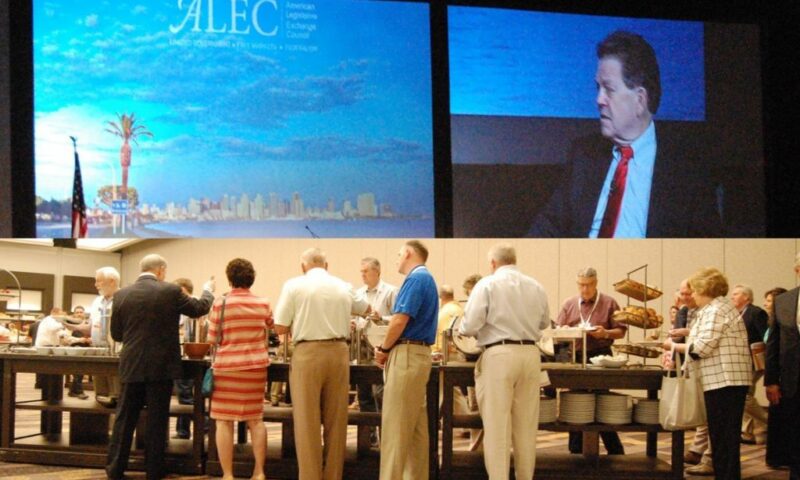
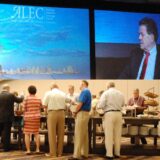
“The biggest scam of the last 100 years is global warming!” thundered Stephen Moore to ALEC’s plenary breakfast club this morning. “It’s no surprise that when you give these professors $10 billion, they’re going to find a problem.” Moore then singled out North Dakota for its regulatory-free attitudes toward the fracking industry: “I just have one message for you — drill, baby, drill!”
See more of our coverage of the ALEC Annual Meeting
The annual meeting of the American Legislative Exchange Council began wrapping up business in San Diego Friday on this defiant note from Moore, a former Wall Street Journal writer. This newly hired Heritage Foundation economist is an apostle of completely eliminating state income taxes and has been in a running feud with liberal economist and New York Times columnist Paul Krugman, over Moore’s casual regard for accurate reporting.
Moore’s speaking partner today was fellow supply-sider Arthur Laffer,
» Read more about: ALEC Confidential: Tales from the Supply-Side »

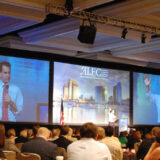
Scott Walker couldn’t have asked for more.
When the Wisconsin governor took the dais Thursday at the American Legislative Exchange Council’s annual conference in San Diego, his audience was ravenous for any vision that included destroying unions and cracking down on America’s criminal underclass.
See more of our coverage of the ALEC Annual Meeting
The venue was the plenary croissants-and-eggs breakfast, but it would be hard to imagine an audience hungrier for the red meat Governor Walker threw out to it.
Every key bill Walker has been associated with, since his get-tough-on-crime heyday as a state assemblyman in the 1990s, has been a plagiarism of an ALEC model bill. Such as laws that eliminated parole (and ballooned state prison populations) or that imposed a voter ID law, gutted public education and teacher protections, and made Wisconsin the 25th right-to-work state.
» Read more about: ALEC Confidential: Scott Walker Talks the Walk »


For several tense hours yesterday San Diego’s plush Manchester Grand Hyatt hotel, located in the city’s Embarcadero district, felt more like Athens’ besieged Parliament than a resort on California’s laid-back shoreline.
Around 2 p.m. the hotel, which is playing host to this year’s annual meeting of the American Legislative Exchange Council (ALEC), sealed off all entrances except its main lobby in what became a virtual lockdown.
See more of our coverage of the ALEC Annual Meeting
For the 1,300 state legislators and corporate lobbyists gathered inside, the perceived security threat turned out to be from those who stand the most to lose from ALEC attacks on workplace rights, minimum wage laws and state health and environmental standards — California workers.
An estimated 2,500 protestors, carrying placards declaring California to be an “ALEC-Free Zone,” gathered around 1 p.m. in Embarcadero Marina Park to hear a series of speakers lambasting the secretive,
» Read more about: Labor Rally Sends ALEC Conference Into Lockdown Mode »
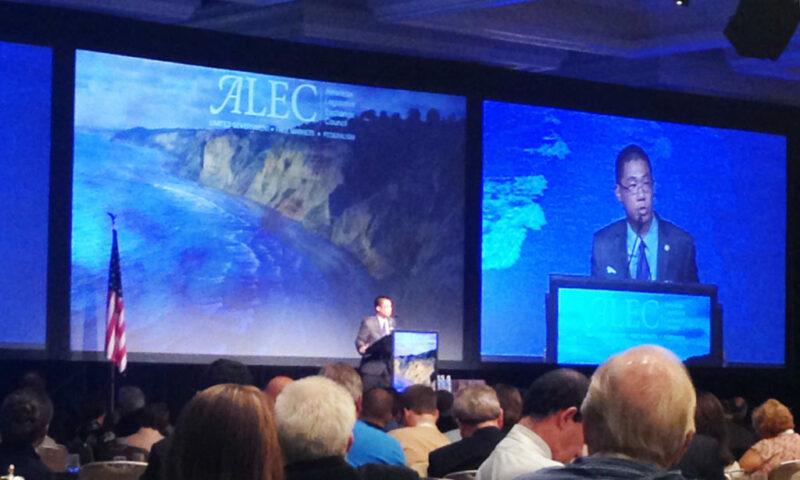
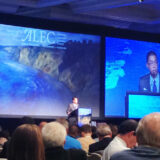
The 42nd Annual Meeting of the American Legislative Exchange Council (ALEC) got underway in earnest Wednesday at San Diego’s Manchester Grand Hyatt resort hotel. The mood was convivial and the attire corporate casual: Brooks Brothers suits without ties, Dockers and sports shirts.
Although this year’s star attractions — a GOP presidential frontrunner, Wisconsin Governor Scott Walker, and a returning presidential contender, former Arkansas Governor Mike Huckabee — weren’t scheduled to speak until Thursday, conference delegates had plenty to do yesterday.
The packed opening luncheon featured Iowa’s virulently anti-immigrant Congressman, Steve King.
ALEC, a secretive rightwing bill mill that gets its funding from the Koch Brothers and global multibillion dollar corporations, has been described as a legislative dating service that arranges hookups between mostly Republican state lawmakers and corporate lobbyists.
See more of our coverage of the ALEC Annual Meeting
The actual “dates” occur at meetings like those unfolding in San Diego — a council spokesperson said 1,300 conferees were in attendance — and take place behind locked doors,
» Read more about: ALEC Confidential: Inside the San Diego Conference »